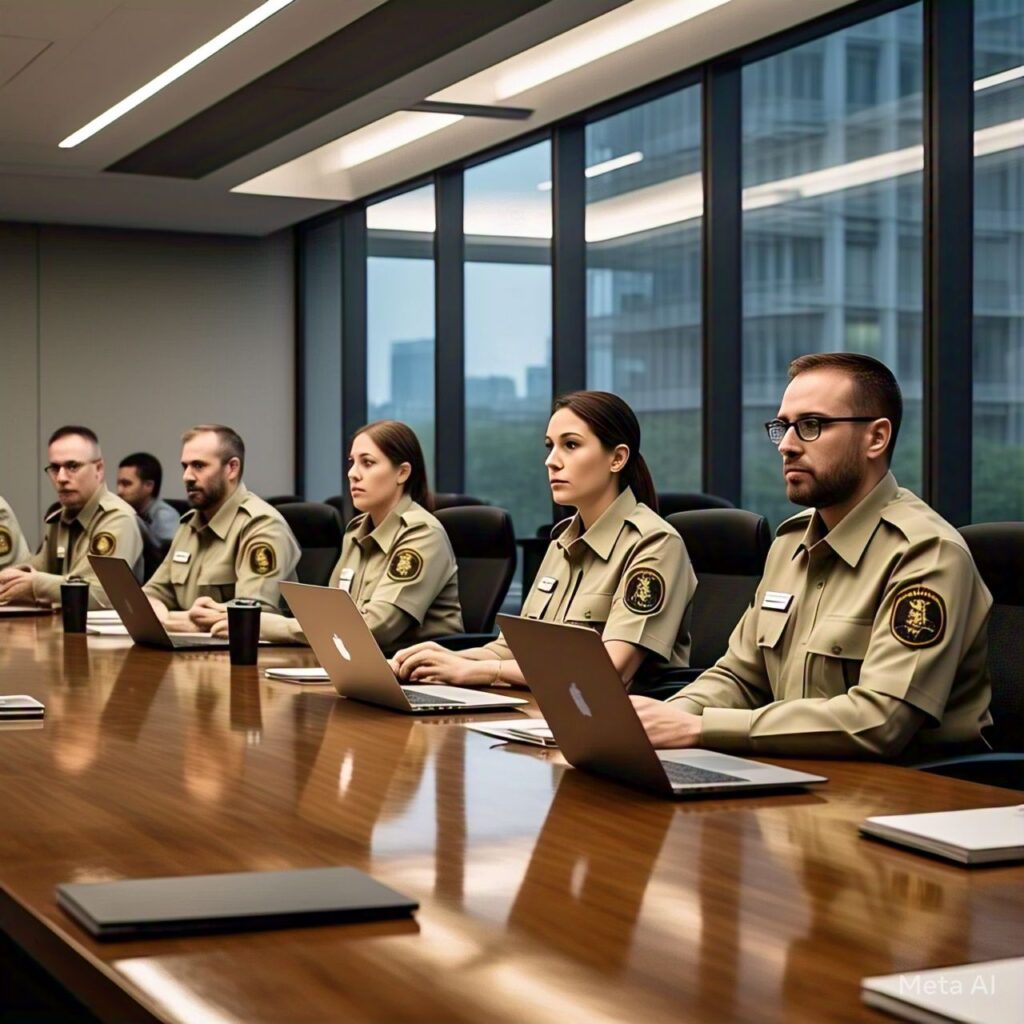How to Establish a Security Guard Business in Australia
Starting a security guard business in Australia is a venture that can bring both financial success and the satisfaction of providing essential protection to clients. Given the increasing demand for safety and security, this industry offers ample opportunities for growth. This guide will take you through each step in establishing a successful security guard business, covering everything from market research to compliance and marketing.
How to become a security guard in Australia?
1. Conducting In-Depth Market Research to Identify Your Niche and Client Needs
Before diving into the security industry, it’s crucial to conduct comprehensive market research to understand the current landscape and identify your ideal niche. Begin by examining local and national demand for various types of security services, such as event security, retail and loss prevention, corporate security, and residential patrol services. Australia has diverse security needs across these sectors, and targeting a specific niche helps position your business effectively in the market. Use surveys, competitor analysis, and interviews with potential clients to gather data on gaps in existing services. Additionally, analyzing industry reports and government data on security trends will provide valuable insights that can shape your business strategy.

2. Crafting a Comprehensive Business Plan That Defines Your Goals and Financial Strategy
A well-structured business plan is foundational to launching and sustaining a security guard business. Start by outlining your company’s mission, vision, and core values, as these will guide your brand identity and help differentiate you from competitors. Include a detailed description of the services you plan to offer, your target market, and a unique value proposition. Next, address your financial projections, estimating startup costs, expected revenue, and profitability timelines. Your plan should also include an analysis of operational costs such as training, equipment, insurance, and employee wages. A comprehensive business plan not only provides a roadmap for your business but also positions you to secure funding or attract potential investors.

3. Meeting Legal and Licensing Requirements for Security Companies in Australia
Starting a security guard business requires strict adherence to Australia’s regulatory and licensing requirements. In each state or territory, you must apply for a Private Security Business Licence, which validates your company’s qualifications to provide security services. You will also need an Australian Business Number (ABN) and to register your business with the Australian Business Register. Additionally, each security officer you employ must complete accredited training, like the Certificate II or III in Security Operations, and hold individual security licences. Regularly review these requirements as state regulations may vary, and staying compliant ensures you avoid legal issues and maintains your business’s reputation.

4. Obtaining Certifications and Ensuring Staff Training Standards Are Met
Certifications are a hallmark of professionalism and are essential in the security industry. To build a reputable team, ensure all employees complete government-approved training programs. Start with basic certifications such as Certificate II or III in Security Operations, which covers essential skills like risk management, emergency response, and first aid. Offering advanced training in conflict resolution, crowd control, and surveillance enhances your team’s abilities and increases the value you provide to clients. Regular skill updates and annual compliance checks will keep your staff prepared for changing security demands and maintain high service standards across your operations.

5. Securing Comprehensive Insurance Coverage to Protect Your Business and Staff
Insurance is indispensable in the security industry, where risks are a daily reality. As a business owner, securing public liability insurance protects you from potential claims of property damage or personal injury involving your services. Additionally, workers’ compensation insurance is legally required in most Australian states and covers any injuries your employees may sustain on duty. Explore specialized insurance products designed for security businesses that can cover liability for incidents related to property protection, surveillance, and crowd management. Proper insurance coverage not only safeguards your finances but also reinforces your commitment to a responsible and safe work environment.

6. Hiring Qualified Security Personnel and Building a Trustworthy Team
The quality and professionalism of your staff play a significant role in the success of your security guard business. When hiring, prioritize individuals with relevant experience, proper certifications, and a clean background check. Implement a thorough recruitment process that assesses candidates’ interpersonal skills, physical fitness, and crisis management capabilities. Once hired, provide continuous training to refine skills in areas like communication, observation, and conflict de-escalation. Building a team of reliable and well-trained guards will set your business apart and instill confidence in clients who rely on you for their safety needs.

7. Providing Essential Equipment and Uniforms to Enhance Professionalism and Efficiency
Equipping your staff with the right tools is essential for providing effective security services. Your business should invest in two-way radios, body cameras, flashlights, and other tools necessary for communication and documentation. Equally important is providing standardized uniforms that create a professional appearance and make guards easily identifiable. Consider additional technology such as incident-reporting software, GPS tracking for patrols, and surveillance systems to enhance operational efficiency. High-quality equipment not only ensures safety for both guards and clients but also adds to your agency’s credibility and professionalism.

8. Setting Up a Sound Financial System and Determining Service Pricing
Establishing a solid financial structure is key to managing expenses and ensuring profitability. Open a dedicated business bank account to keep personal and business finances separate, which simplifies tax filings and improves expense tracking. Implement reliable accounting software to monitor income, track expenses, and maintain cash flow. When setting prices, research competitors to understand industry-standard rates and balance them with your service value. Offering a mix of hourly rates, daily rates, and annual contracts can attract diverse clients while allowing flexibility in meeting their specific needs.

9. Building a Professional Website and Establishing a Digital Presence
A well-designed website is essential for establishing credibility and attracting clients. Your website should clearly outline your services, credentials, client testimonials, and contact information. Implement SEO best practices by optimizing for keywords like “security guard services Australia” to improve your site’s visibility on search engines. Consider including a blog section where you publish industry insights, security tips, or case studies to showcase your expertise and drive organic traffic. An optimized digital presence not only boosts your online reputation but also serves as a platform for client education and engagement.

10. Implementing a Robust Marketing Strategy to Grow Your Client Base
Marketing is vital in a competitive industry like security services. Develop a strategy that combines digital marketing, local advertising, and networking to maximize reach. Social media platforms like LinkedIn and Facebook are ideal for building a brand presence, while Google My Business can help local clients discover your services. Additionally, partnering with event organizers, property managers, and corporations can lead to steady contracts and referrals. Content marketing is also effective; sharing security-related insights and news on your website can attract clients looking for knowledgeable security solutions.

11. Drafting Client Contracts That Outline Service Scope and Expectations
Professional contracts are essential to clarify the terms of service and protect your business from potential disputes. Each contract should specify responsibilities, service hours, rates, cancellation terms, and liability limits. Consider offering a variety of service options, such as on-call, 24/7, or event-based security, to cater to different client needs. Contracts serve as a foundation of trust between you and your clients, ensuring both parties are clear on expectations and minimizing risks of misunderstandings or conflicts down the line.

12. Leveraging CRM Software to Strengthen Client Relationships and Manage Schedules
A Customer Relationship Management (CRM) system can significantly improve client management and streamline scheduling. Using CRM software allows you to maintain a record of client interactions, track service requests, and send reminders for upcoming contracts or service renewals. This not only strengthens client relationships but also enables you to manage appointments efficiently and ensure timely service delivery. With a CRM in place, your business can respond to client needs faster and maintain organized communication across multiple accounts.

13. Ensuring Compliance and Regularly Updating Staff on Industry Standards
In the ever-evolving security industry, maintaining compliance with state and federal regulations is paramount. Regularly review your business’s adherence to current laws, training standards, and industry certifications to stay compliant and prevent legal issues. Hold routine training sessions to keep your staff updated on regulatory changes, emerging security technologies, and advanced protection strategies. Keeping up with industry standards not only mitigates risk but also enhances your company’s image as a reliable and responsible security provider.

14. Networking and Building Industry Partnerships to Expand Your Reach
Networking can open doors to new clients and valuable business partnerships. Attend trade shows, industry seminars, and business meet-ups to connect with potential clients and other security professionals. Collaborate with event planners, real estate developers, or corporate entities that regularly require security services. These connections can lead to recurring contracts, referrals, and opportunities for business expansion. Building a network of industry contacts enhances your reputation and creates a foundation for growth in a competitive market.

15. Evaluating Business Performance and Adapting to Client Feedback
Regular evaluation is crucial to sustaining growth and improving service quality. Track key performance indicators (KPIs) such as client retention, contract renewals, revenue growth, and employee performance. Additionally, actively seek feedback from clients to identify areas for improvement. Using this feedback constructively can help you refine services, adapt to market changes, and continuously deliver value. Monitoring business performance not only aids in strategic planning but also positions you as an adaptable and client-focused security provider.

